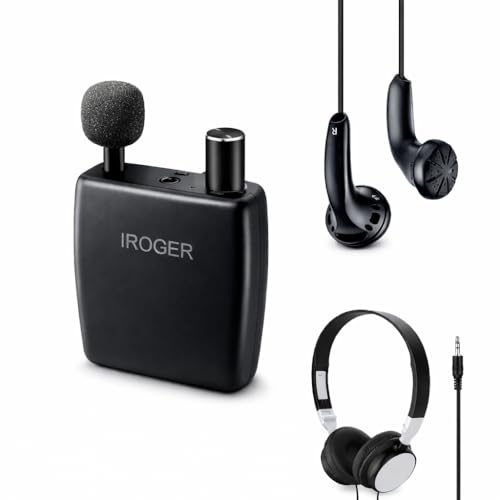Ever thought about what it would take to start a career as a hearing aid dispenser?
The path to becoming a hearing aid dispenser involves a blend of compassion, technical knowledge, and communication skills.
As we explore the steps needed to pursue this profession, you'll discover the unique aspects of this role that make it a compelling choice for those seeking a fulfilling career that combines helping others with a sense of professional accomplishment.
Key Takeaways
- Specialized training and licensing are essential for becoming a hearing aid dispenser.
- Career growth opportunities include pediatric audiology and leadership roles.
- Industry outlook is positive with a growing demand for hearing aids.
- Average salary of $50,821 offers stable employment and impact potential.

IROGER Hearing Amplifier for Seniors, Personal Sound Amplifier, Smart Auto-Gain, Directional Microphone, Rechargeable with 120-Hour Battery, Headphones & Earbuds Included
Smart Auto-Gain Control – Enjoy crystal-clear sound at all times. iRoger automatically balances audio levels to enhance voices...
As an affiliate, we earn on qualifying purchases.
Job Description of Hearing Aid Dispenser
As Hearing Aid Dispensers, our primary responsibility involves conducting comprehensive audiogram tests to accurately assess the hearing capabilities of individuals. These tests are crucial in determining the extent of hearing loss and the specific frequencies affected, allowing us to make informed recommendations for suitable hearing aids. We take pride in our ability to conduct these tests with precision and empathy, understanding the impact that hearing loss can have on an individual's quality of life.
When we conduct hearing tests, we not only focus on the technical aspects but also on creating a supportive and comfortable environment for our patients. By guiding them through the process and explaining each step clearly, we ensure they feel at ease and confident in the care they're receiving. Our goal is to provide personalized solutions that meet their unique needs and preferences, ultimately improving their overall hearing experience. Conducting these tests isn't just a job for us; it's a way to make a meaningful difference in the lives of those we serve.

Neosonic Rechargeable Hearing Amplifier to Aid TV Watching and Conversation, Wireless Neckband Headphones for Seniors & Adults, Remote Microphone Noise Cancelling - NW10 Pro
BACKGROUND NOISE REDUCTION - Equipped with a wireless external microphone, the NW10 Pro allows you to place the...
As an affiliate, we earn on qualifying purchases.
Educational Requirements for Hearing Aid Dispenser

To become a Hearing Aid Dispenser, meeting the minimum educational requirement involves completing specialized training programs specifically designed for hearing aid dispensing. These programs equip individuals with the necessary knowledge and skills to serve the hearing-impaired community effectively.
When pursuing a career in this field, it's essential to consider the following emotional aspects:
- Empathy: Understanding the challenges faced by individuals with hearing loss can help in providing compassionate care.
- Dedication: Committing to ongoing learning and professional development ensures that the best services are offered to those in need.
- Support: Offering a supportive environment for individuals adjusting to hearing aids can make a significant difference in their lives.

IROGER Hearing Amplifier Rechargeable Hearing Device with Standard Headphone Personal Sound Amplifier PSAP for Ears,Seniors,Directional Microphone
Auto Gain Control for Clearer Sound-- Automatically adjusts volume levels to deliver balanced, high-quality sound amplification. Ideal for...
As an affiliate, we earn on qualifying purchases.
Licensing Process for Hearing Aid Dispenser
When beginning the licensing process to become a hearing aid dispenser, it's crucial to understand the requirements and steps involved.
We'll explore an overview of the licensing requirements, offer tips on preparing for the licensing exam, and discuss different options for continuing education in this field.
Our goal is to provide you with a comprehensive understanding of what it takes to become a licensed hearing aid dispenser and maintain high standards of care for individuals with hearing loss.
Licensing Requirements Overview
Navigating the process of obtaining a license as a Hearing Aid Dispenser involves completing specific training programs and meeting state licensure requirements. To become licensed, candidates must complete a two-year full-time diploma from an approved college. This rigorous training ensures that Hearing Aid Dispensers are equipped with the necessary skills and knowledge to serve individuals with hearing impairments effectively. State licensure for hearing instrument dispensing is a vital step towards ensuring the highest standards of care and professionalism in the field. By meeting these licensing requirements, aspiring Hearing Aid Dispensers demonstrate their commitment to providing quality services to those in need.
Completing a comprehensive training program demonstrates dedication to the profession.
State licensure requirements uphold industry standards and ethics.
Meeting these requirements enhances trust and credibility with clients.
Exam Preparation Tips
Transitioning from understanding the licensing requirements to preparing for the exams as a Hearing Aid Dispenser involves honing specific skills and knowledge crucial to success in the field.
To excel in the licensing process, aspiring professionals should focus on both written and practical exams. Studying topics such as hearing aid technology, patient communication, and state laws is essential for the written portion.
As for the practical exams, mastering skills like conducting hearing tests, fitting hearing aids, and troubleshooting device issues is key. By diligently preparing for these exams, individuals can increase their chances of becoming a Licensed Hearing Aid Dispenser.
Continuing Education Options
Exploring the diverse array of continuing education options plays a pivotal role in the licensing process for aspiring Hearing Aid Dispensers. To succeed in this field, individuals must consider various factors when choosing the right path for their education.
- Hearing aid dispenser training programs offer specialized knowledge and hands-on experience.
- Obtaining a state license is crucial for legal practice, ensuring compliance with regulations.
- Some programs provide accelerated options, allowing individuals to become licensed hearing aid dispensers in a shorter timeframe.

Joanbro Personal Sound Amplifier for Seniors, Voice Enhancement Devices, Pocket Sound Amplifiers for Elderly People, Adults, 50dB Gain, with Headphones & Earbud, 3 Types Mics, 3 Tone, Volume Control
SUPERIOR PERSONAL SOUND AMPLIFIER: Applying noise cancelling, automatic gain control and advanced amplifying circuit, this sound amplifier device...
As an affiliate, we earn on qualifying purchases.
Job Satisfaction in Hearing Aid Dispensing

Job satisfaction in hearing aid dispensing stems from the profound impact on patients' quality of life through improved hearing abilities. Hearing aid dispensers find fulfillment in assisting patients in overcoming hearing challenges, leading to enhanced communication and social interactions.
A survey revealed that 85% of hearing aid dispensers reported satisfaction or high satisfaction with their career choice, highlighting the rewarding nature of the job. Being able to make a tangible difference in people's lives by addressing hearing difficulties contributes significantly to job satisfaction levels among hearing aid dispensers.
The positive outcomes achieved for patients not only improve their ability to hear but also positively influence their overall well-being. Witnessing the transformation in patients' lives, such as increased confidence and engagement, reinforces the meaningful impact of the work.
Ultimately, the satisfaction derived from helping patients regain their hearing and reconnect with the world underscores the deep sense of purpose and fulfillment experienced in the field of hearing aid dispensing.
Salary Expectations for Hearing Aid Dispenser

With an average annual salary of $50,821 and hourly rate of $24, Hearing Aid Dispensers can expect varying salary ranges from $27,000 to $94,000 per year.
It's important to note that the salary for Hearing Aid Dispensers can be influenced by factors such as experience, location, and the type of facility they work in.
Finding fulfillment in helping individuals hear better can often overshadow any concerns about salary discrepancies.
Many Hearing Aid Dispensers find great satisfaction in knowing they're making a significant impact on the quality of life for their clients.
Understanding the salary expectations for Hearing Aid Dispensers is crucial when considering this career path. While the financial rewards can be promising, the true value often lies in the meaningful connections formed with clients and the positive difference made in their lives.
Necessary Skills for Hearing Aid Dispenser

Proficiency in conducting patient evaluations and audiometric assessments stands as a foundational requirement for a hearing aid dispenser. These skills are vital for accurately assessing hearing loss levels and determining the appropriate hearing aid solutions for each individual.
Additionally, expertise in fitting and adjusting hearing aids, along with the ability to repair malfunctioning devices, is crucial in providing optimal care to patients with hearing impairments. Understanding hearing loss management and being able to recommend suitable hearing aids based on specific needs are key competencies for a successful hearing aid dispenser.
Furthermore, effective communication skills play a pivotal role in guiding patients through the selection process and offering education on the proper use of hearing aids. This includes the technical proficiency needed to create ear impressions, customize earmolds, and adjust device settings to ensure maximum comfort and functionality.
Career Growth Opportunities for Hearing Aid Dispenser

Exploring avenues for professional advancement as a Hearing Aid Dispenser can lead to rewarding career growth opportunities in the field of audiology. As a hearing aid specialist, the potential for career development is promising, offering avenues to expand knowledge and impact within the audiology sphere. Here are some key points to consider:
- Specialization Opportunities: Delving into specific areas such as pediatric audiology or tinnitus management can enhance expertise and open doors to new professional challenges.
- Leadership Roles: Progressing from a dispenser to a clinical director allows for overseeing operations, mentoring staff, and shaping patient care strategies.
- Research and Innovation: Engaging in research projects or collaborating with manufacturers can contribute to advancements in hearing aid technology, enriching the field and personal growth.
Job Outlook for Hearing Aid Dispenser

The job outlook for hearing aid dispensers is promising, as there's an increasing demand for hearing aids due to the aging population. This trend translates into more employment opportunities in the field.
Additionally, hearing aid dispensers enjoy competitive salaries and benefits, making it an appealing career choice for those interested in helping others improve their quality of life.
Employment Opportunities Increasing
Employment opportunities for hearing aid dispensers are on the rise, reflecting a positive job outlook in the healthcare support sector. This growth is driven by an increasing demand for elder care services, positioning professions like hearing aid dispensers favorably. As individuals dedicated to serving others, the expansion in job opportunities allows us to make a meaningful impact on the lives of those with hearing impairments.
The recognition of hearing aid dispensers in esteemed rankings like U.S. News & World Report further solidifies the importance and value of this profession. Joining this field not only offers job security but also the satisfaction of knowing you're contributing to enhancing the quality of life for many individuals.
- Contributing to the well-being of the elderly
- Making a positive impact on individuals with hearing loss
- Providing essential healthcare support services
Demand for Hearing Aids
As the demand for hearing aids continues to grow alongside an aging population and increased awareness about hearing health, the job outlook for hearing aid dispensers remains promising. Patients with hearing needs are seeking assistance, creating a steady need for professionals in the field.
With the increasing prevalence of hearing loss among different age groups, the job market for hearing aid specialists is expected to expand. This growth in demand translates to stable employment opportunities and potential for career advancement in the field of hearing healthcare.
As technology advances and more individuals recognize the importance of addressing hearing issues, the role of hearing aid dispensers becomes even more crucial. Overall, the job outlook for hearing aid dispensers is encouraging, offering a fulfilling career serving patients with hearing concerns.
Salary and Benefits
With a focus on the financial rewards and professional advantages, entering the field of hearing aid dispensing can offer a fulfilling and stable career path. Hearing Aid Dispensers earn an average annual salary of $50,821, ranging from $27,000 to $94,000 per year. This career choice provides job stability and the opportunity to make a meaningful impact on individuals with hearing loss.
The growing demand for hearing aid services, especially with nearly one in three people over 65 experiencing hearing loss, ensures a steady flow of job opportunities for Licensed Hearing Aid Dispensers. By choosing this profession, individuals can enjoy not only a respectable income potential but also the satisfaction of helping others improve their quality of life.
Frequently Asked Questions
Is a Hearing Aid Dispenser a Good Job?
It's important to consider if a hearing aid dispenser is a good job choice.
We believe it's a rewarding career that offers stability and the chance to make a positive impact on individuals' lives.
Helping people improve their communication and health outcomes brings job satisfaction.
With the growing demand for hearing aid services, this profession allows us to serve others while enjoying a competitive salary.
Is Being a Hearing Aid Specialist Stressful?
Being a hearing aid specialist can be stressful due to the responsibility of diagnosing hearing issues and recommending solutions. The demand for accurate assessments and treatment options adds pressure, along with staying updated on technology and regulations.
Balancing patient needs can also be challenging. Despite these stressors, the rewarding feeling of improving someone's quality of life through better hearing often outweighs the stress for many specialists.
How Do I Get Into the Hearing Aid Industry?
Getting into the hearing aid industry involves completing a training program and obtaining a state license.
Further specialization can be achieved through a two-year diploma program and enhancing qualifications by preparing for the International Licensing Exam.
Accelerated entry options exist for those seeking a faster route into the profession.
It's a rewarding path that requires dedication and a desire to help others improve their quality of life through better hearing.
How Do I Become a Hearing Aid Dispenser in Usa?
To become a hearing aid dispenser in the USA, you must complete a hearing aid dispenser training program and obtain a state license for hearing instrument dispensing.
The minimum requirement is a two-year full-time diploma from an approved college, with an option to prepare for the International Licensing Exam in 3 to 6 months.
Some individuals may become licensed in less than 3 months by following the necessary training and licensing requirements.
Is Becoming a Hearing Aid Dispenser a Prerequisite for Expert Hearing Aid Repair?
Becoming a hearing aid dispenser is not necessarily a prerequisite for expert hearing aid repair. Many skilled technicians undergo stepbystep hearing aid repair training to develop the necessary expertise. While a dispensing background can be helpful, it is not the only path to becoming proficient in hearing aid repair.
Conclusion
In conclusion, becoming a hearing aid dispenser offers a fulfilling career path with opportunities for growth, satisfaction, and competitive earnings. By conducting tests, recommending devices, and providing support, we play a vital role in improving individuals' quality of life.
With the right skills, education, and licensing, we can make a difference in people's lives while enjoying a rewarding and meaningful career. Embrace the journey of becoming a hearing aid dispenser and make a positive impact on those in need.










